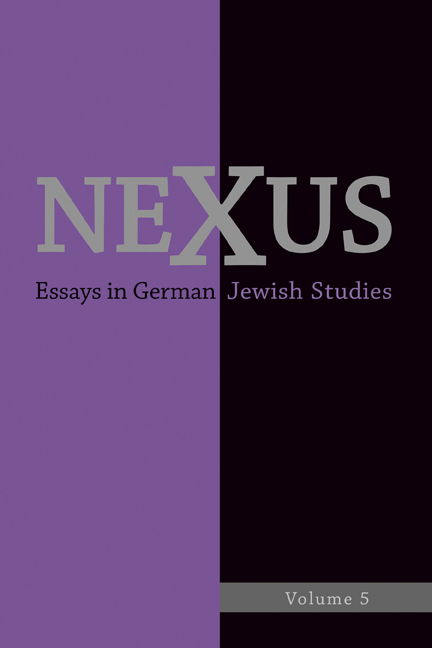 Nexus: Essays in German Jewish Studies, Volume 5
Nexus: Essays in German Jewish Studies, Volume 5 Published online by Cambridge University Press: 24 March 2021
THE PRONOUNCED TENDENCY among the most widely read Holocaust historians, with Saul Friedländer's 1997 Nazi Germany and the Jews: The Years of Extermination marking a significant departure, has been to ignore victims’ perspectives almost completely as extraneous to an account of how the Nazi genocide of European Jews transpired. The texts written by victims that have received the most attention have, moreover, tended to be testimonial works, generally regarded as more crucial than fiction or poetry for understanding victims’ experience. Scholars of Holocaust literature, for their part, have focused overwhelmingly on texts written after, not during, the Shoah. This constellation has left the corpus of literary texts written by Jewish victims during the Holocaust underexplored. Although many scholars, including Samuel Kassow, Alan Mintz, and David Roskies, have forcefully underscored the crucial importance of distinguishing between texts that grapple with the catastrophic events as they were unfolding, on the one hand, and writing on what we now call the Holocaust that is organized from a retrospective vantage point, on the other, this fundamental distinction is seldom insisted on as forcefully and cogently as it deserves to be. And while some literary scholars—most abidingly Roskies—and cultural historians have explored crucial aspects of how inmates of ghettos adopted, reworked, stretched, and rejected literary genres and archetypes as they grappled with their extreme situations, continued work on these questions remains a desideratum.
In particular, the theorization of the relationship between poetry and the Holocaust has been elaborated in near-hermetic disregard for the poetry that victims wrote during the time of the genocide. In part, this was an unintended consequence of the debate that Theodor W. Adorno initiated with his intentionally provocative and lapidary dictum from “Kulturkritik und Gesellschaft” (“Cultural Criticism and Society,” written 1949 and published 1951) that “nach Auschwitz ein Gedicht zu schreiben, ist barbarisch” (Writing a poem, after Auschwitz, is barbaric). While frequently misquoted, taken out of its intricate context, and reduced to an empty soundbite, Adorno's pronouncement provided the terms for the most prominent critical conversation about poetry and the Holocaust, the effects of which are still evident seventy years after he made it.
To save this book to your Kindle, first ensure [email protected] is added to your Approved Personal Document E-mail List under your Personal Document Settings on the Manage Your Content and Devices page of your Amazon account. Then enter the ‘name’ part of your Kindle email address below. Find out more about saving to your Kindle.
Note you can select to save to either the @free.kindle.com or @kindle.com variations. ‘@free.kindle.com’ emails are free but can only be saved to your device when it is connected to wi-fi. ‘@kindle.com’ emails can be delivered even when you are not connected to wi-fi, but note that service fees apply.
Find out more about the Kindle Personal Document Service.
To save content items to your account, please confirm that you agree to abide by our usage policies. If this is the first time you use this feature, you will be asked to authorise Cambridge Core to connect with your account. Find out more about saving content to Dropbox.
To save content items to your account, please confirm that you agree to abide by our usage policies. If this is the first time you use this feature, you will be asked to authorise Cambridge Core to connect with your account. Find out more about saving content to Google Drive.